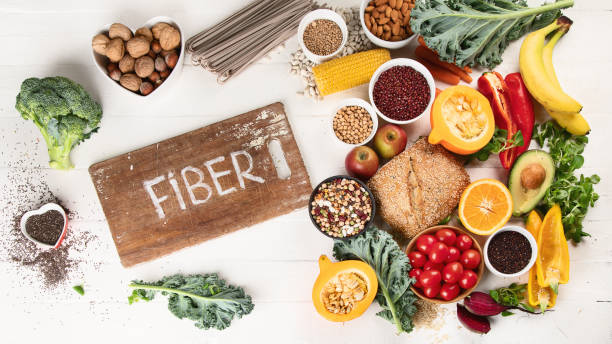Fiber is a carbohydrate. High-fiber foods include fruits, vegetables, legumes, and grains.
What Are the Health Benefits of Fiber?
Humans can't digest it, but research from 2009 shows fiber offers several health benefits, such as:
- Lowering blood pressure
- Lowering cholesterol levels
- Enhancing insulin sensitivity
- Assisting individuals with obesity lose weight
- Improving immune function
Fiber comes in two different forms: soluble and insoluble. Both types are essential for good nutrition.
Soluble fiber can dissolve in water and gastrointestinal fluids. When you ingest soluble fiber, the colon breaks it down into a gel that's then digested by gut bacteria.
RELATED: 7 Things That Can Happen When You Don’t Get Enough Fiber
You can find soluble fiber in foods like:
- Oats
- Black beans
- Lima beans
- Avocado
- Pears
- Nectarines
- Carrots
- Sweet potatoes
- Broccoli
- Hazelnuts
- Sunflower seeds
Insoluble fiber can't dissolve in water or other fluids, which means it remains mostly intact during digestion. It helps form stools and control constipation.
The following foods are rich in insoluble fiber:
- Wheat bran
- Whole grains
- Cauliflower
- Potatoes
- Green beans
- Nuts
The Food and Drug Administration (FDA) advises that adults consume 28 grams of fiber per day.
RELATED: How To Add More Fiber To Every Meal Of The Day
Coronary Heart Disease Benefits
Individuals consuming high amounts of dietary fiber can significantly decrease their incidence and mortality from cardiovascular disease.
Colon Cancer Benefits
Eating a high-fiber diet is correlated with a reduced risk of colorectal cancer, according to new research that analyzed 25 different studies.
Total fiber intake and fiber from whole grains and cereals were most strongly linked with a reduction in colorectal cancer risk, the researchers say.
Digestive Health Benefits
Dietary fiber increases the weight and size of your stool and softens it. A bulky stool is more comfortable to pass, reducing your chance of constipation. If you have loose, watery stools, fiber may help solidify the stool because it absorbs water and adds bulk to the stool.
Fiber helps support bowel health. A high-fiber diet may decrease your risk of developing hemorrhoids and small pouches in your colon (diverticular disease). Studies have also shown that a high-fiber diet likely reduces the risk of colorectal cancer. Some fiber is fermented in the colon.
Researchers are looking at how this may play a role in preventing colon diseases.
RELATED: 7 Good Things That Will Happen To Your Body When You Eat More Fiber Daily
Ulcerative Colitis Benefits
Some research has demonstrated that fiber may be advantageous for managing ulcerative colitis during periods of remission.
According to research from 2015, dietary fiber can extend remission from UC and reduce lesions in the intestines by decreasing activity in mucosal mast cells. These cells are vital to helping your gut function and maintaining your intestinal barrier, but they may trigger an immune response, which leads to inflammation.
A study from 2003 found that 22 people with UC in remission experienced no gastrointestinal complaints or UC relapses when they ate 60 grams of fiber-rich oat bran per day for three months.
A study from 2020 discovered that participants with mild UC or UC in remission who ate a low-fat, high fiber diet experienced decreased inflammation and improved quality of life. The analysis included only 17 people, so the results may not apply to a larger population.
Fiber generally isn't deemed helpful during UC flares. The UK's National Health Service recommends following a low fiber diet to help improve symptoms of UC during a flare-up.
Conclusion
Either way, it's a good idea to check in with a doctor or dietitian before reducing or increasing the amount of fiber in your diet. Fiber can significantly improve some serious health conditions. Fiber is crucial to good gut and digestive health. Make sure you consult with a physician to get the right amount of fiber to meet your dietary needs.










